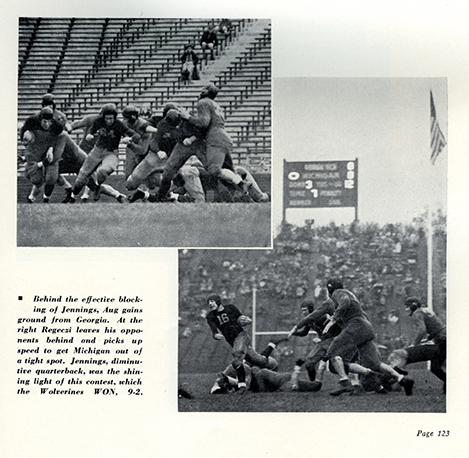
Georgia Tech and Willis Ward
They first met on what was for both of them their first day in college. Long lines of students filed into Waterman Gymnasium to register for classes and pay tuition. Jerry Ford noticed the African-American Detroit athlete. “This chap came over to me and said, ‘I’m Jerry Ford. Aren’t you Willis Ward from Detroit?’” Ward recalled. There began a friendship that would stretch beyond the campus gridiron.
Ford and Ward toiled through their freshman year, competing for a chance to make the varsity team. Ward would become a backup right end to the great Ivy Williamson, captain of the 1932 squad, before becoming a starter his junior year. Ford would win the Most Promising Freshman award but would have to wait until his senior year to become starting center. It was in the third game of a disappointing senior campaign, however, where their stories fused. The previous year Athletic Director Fielding Yost struck a deal with Georgia Tech to play a game in Ann Arbor. As the 1934 game approached, the southern school insisted that Michigan not field its star right end. In an age of segregation, Tech forswore playing with or against African Americans. Yost agreed after wringing from Tech the concession that they would pull their star end, E. H. Gibson.
The campus erupted when the news leaked. Demonstrations were held, petitions were circulated, and threats to disrupt the game issued. Ford was angry and considered not playing. Looking for advice, he called his father, who said, “You have an obligation to the team and the school.” Ford thought he also had an obligation to Ward, whom he talked to next. “Willis urged me to help the team.”
Ford centered the ball that Saturday on a field soaked by October rains.Gibson watched from the sidelines, and Ward watched from the press booth. Perhaps the rain dampened the crowd’s enthusiasm. Among the 30,000 spectators, no protests were made; the fight was confined to the gridiron. Punt followed punt that day, and dropped passes made advances rare. The score was tied at halftime when Michigan’s captain, Tom Austin, saw his day end by injury. Ford stepped in, and the campus newspaper reported that he “proved himself an aggressive leader when he took over.”
Shortly afterward, Georgia Tech was forced to punt once again.Michigan’s replacement quarterback, Ferris Jennings, returned the ball 68 yards for the game’s only touchdown. Michigan later would add a safety and leave the muddy field a 9-2 victor.Perhaps the team felt vindicated, but some believed that so much was given by the Wolverines on that Saturday that little was left for the remainder of the season.The team would win no more games and be outscored 98-12. In fact, the Georgia Tech game would be the last football game Gerald Ford would ever win.


